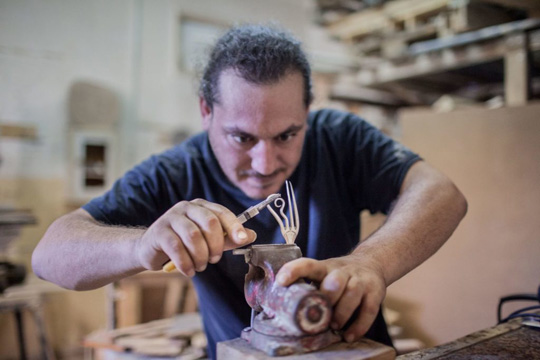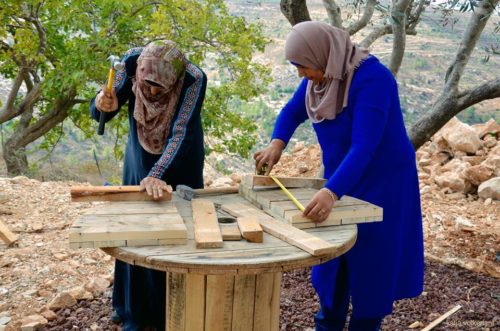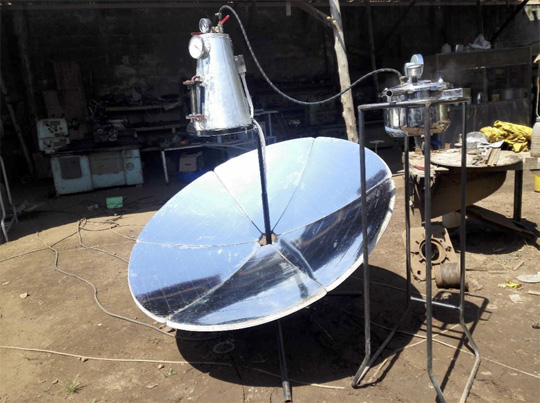Sustainable Partnerships
Freiburg, Mar 29, 2018
The OneLife project helps German companies network with those from the Global South. The aim is to help the southerners develop sustainably, without forcing them to adopt alien structures. So the business partnerships benefit both sides – and the environment as well.
 Making art out of waste wood: Ala Hilu in his workshop in Palestine.
Making art out of waste wood: Ala Hilu in his workshop in Palestine.
Photo: Ala Hilu
The Palestinian Ala Hilu works with waste wood, using it to build market stalls, furniture and other commodities. Now he also wants to produce spectacle frames from waste wood. But the small trader cannot afford the CNC milling machine he requires. “We’ve found a German manufacturer who can supply him with the machine,” says Saji Zagha from OneLife. Back in 2017 the student project arose from the Environmental Governance (MEG) international Master’s degree of the University of Freiburg, and immediately won the campusWELTbewerb competition for global sustainability at Baden-Württemberg-based universities. Further success followed in March 2018: the team took first prize in Tunisia in the Hult Prize Regionals, the world’s largest competition for start-ups in the sustainability industry.
“We want to promote small and medium-sized enterprises [SMEs] from the Global South by bringing them together with German companies,” says OneLife co-founder Laila Berning. The project provides information, technology and financial aid to companies in the south – as a basis for sustainable fair development. The North-South partnerships are intended not only to benefit both sides but also the environment.
Mediating deals and trust
It is hard for small companies like that of Ala Hilu to develop without help. “Usually they lack the money, suitable equipment or both,” says Zagha. Many businesses fail. One of the goals of the OneLife partnerships is to prevent this. Also, they want to support local structures instead of importing alien ones. In Ala Hilu’s case, the team not only found the right German company, it also helps with other aspects: since Hilu only speaks Arabic, OneLife translates all his communications and develops a profitable business plan.

Ala Hilu’s upcycling company promotes women and gender equality.
Photo: Ala Hilu
One condition for a small business to be selected is that it pursues as many sustainable development goals as possible. The member states of the United Nations compiled a catalog of these Sustainable Development Goals in Rio de Janeiro, Brazil, in 2012. Hilu’s upcycling company promotes women and gender equality. It benefits people and the environment, for instance by preserving natural resources, reducing the quantity of waste and creating jobs. “Ala has been committed to sustainability for years,” says Zagha. And the partner company from the Global North should share a similar philosophy. “They don’t have to build up trust towards business partners from the south,” says Berning, “they just have to trust us.” OneLife also helps with translation, applications and how to meet foreign statutory regulations. Knowledge of local conditions can also play a part: negotiating with corrupt officials is different to those who cannot be bribed. Naturally donors such as the CNC supplier need to receive some return for investments, Berning emphasizes, “This is not a philanthropic engagement, but bringing about real business partnerships.”
Assistance from a Worldwide Network
The core team of OneLife consists of five people. Three of them developed the idea into a project on the MEG degree program, which has been in existence for 14 years. “Currently we have on average around 37 students from 21 nations per degree program,” says program head and OneLife mentor Prof. Dr. Heiner Schanz from the Institute of Environmental Social Sciences and Geography. Almost 400 people from almost every corner of the earth have already completed the degree. They make up a worldwide MEG network of scientists, entrepreneurs, government officials and consultants. “They bring plenty of expertise with them and have a finger in every pie,” says Schanz. OneLife can draw on this competence network to find projects worth supporting, initiate and develop North-South partnerships.
Zagha hopes there will be 100,000 of them in ten years, “I hope we grow exponentially.” The company will then finance itself with small commission fees. “We want to achieve greater sustainability through business,” stresses Zagha. There’s still more to do to achieve this: launching more partnerships, developing the details of the business model, expanding the German network of medium-sized supporters, registering OneLife as a start-up and seeking more start-up funding. “Our financing from the campusWELTbewerb runs out in March 2018,” Zagha says regretfully. The Federal State Ministry of Science, Research and Art and the Federal State Ministry of the Environment, Climate and Energy Sector run the competition to support global sustainable university projects from Baden-Württemberg.
In the running for the “Nobel Prize for Students”
“The prize money was a good jump-start,” says Berning. The same is true, she and Zagha say, of the advice from the Founders’ Office of the University of Freiburg, “It was very helpful.” In business terms, the team want to focus on sustainable manufacturing in sectors such as agriculture, waste management and renewable energies. In time, they plan to add additional sectors such as sustainable housing. “We’re also sounding out the health sector,” says Berning. “Noor Medical”, the new development which won the team the Hult prize, comes in this category. The highly-endowed international award has been called the "Nobel Prize for Students”. If the team can win through in the next eliminating rounds, they can win up to 1 million US dollars.
 Together with an engineer from Uganda the team is developing a disinfection machine that operates using solar thermal energy – a means of coping with unreliable electricity supplies.
Together with an engineer from Uganda the team is developing a disinfection machine that operates using solar thermal energy – a means of coping with unreliable electricity supplies.
Photo: Enock Musasizi
OneLife is in the running with a special disinfecting machine, a hybrid autoclave. In the Global South three billion people receive medical treatment in rural clinics. Their electricity supply is often insecure. Often, when it fails the staff have to decide whether to operate with unclean equipment or not at all. Difficulties like this can cause millions of unnecessary health problems and deaths. The hybrid autoclave being developed jointly by the team and an engineer from Uganda operates using solar thermal energy when the sun is out. If it is overcast, a photovoltaic module generates sufficient energy. In an emergency the unit has a plug and can be operated with generators.
Laila Berning and Saji Zagha see positive aspects even without the competition, “Even if we don’t win, the competition offers good opportunities to make new international contacts.” And the concept of the autoclave will endure. So if in the near future it saves the lives of a couple of hundred or thousand people, OneLife is a winner in any case.
Jürgen Schickinger

